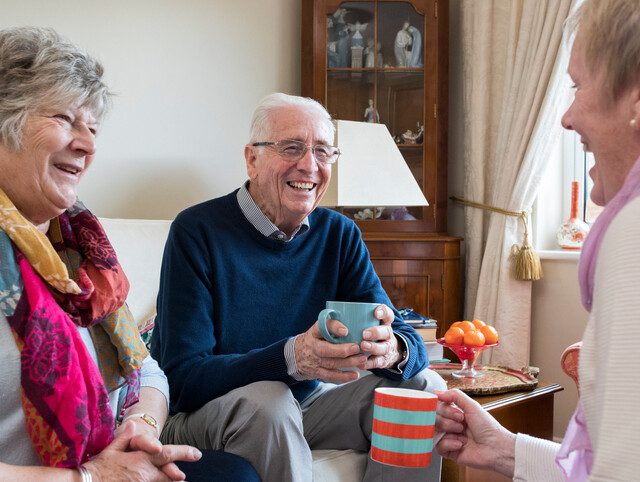In the United States, there are more than 6 million people living with Alzheimer’s and other dementias. Dementia is an umbrella term for the loss of cognitive abilities that are severe enough to impact daily functioning. Alzheimer’s is the number one cause of dementia.
If someone you love is showing signs of memory loss or has been diagnosed with Alzheimer’s, you might be wondering how you can best support them and ensure they receive the care they need. We dive into those options below.
Signs & symptoms of Alzheimer’s
Some forgetfulness can just be a normal sign of aging and nothing to be alarmed about. Forgetting to pay a bill on time, for instance, but remembering later and paying it, is not necessarily a cause for concern. Forgetting to pay a bill for months on end and not realizing it, however, could be an indication of something more than just normal aging. Memory issues that are more than just occasional forgetfulness, include drastic changes in mood and behavior, or put your loved one or others in harm’s way, could be an indication of Alzheimer’s or other dementias.
The Alzheimer’s Association provides these 10 early signs and symptoms of dementia to look out for, but if you have any concerns about the mental faculties of a loved one, it’s best to talk to a medical professional sooner rather than later. Early diagnosis of Alzheimer’s can lead to treatment options that lessen symptoms and also allows you and your loved one more time to plan for the future.
How You Can Support Your Loved One
If your loved one receives an Alzheimer’s diagnosis, it’s important to know what stage of the disease they are in — early, middle or late. Each stage of Alzheimer’s brings new challenges, but your constant love and support will remain invaluable through all of them.
Many individuals in the early stages of Alzheimer’s are able to continue living independently with minimal assistance. Memory cues or reminders for tasks and to-dos can be helpful in this stage. You can support your loved one by encouraging a healthy diet and exercise and establishing a daily routine.
In the middle stage of Alzheimer’s, you might notice additional cognitive decline in your loved one and they may have difficulty with daily functioning. You can best support your loved one in this stage by encouraging their strengths and assisting them with daily tasks. You and your loved one both might benefit from the addition of outside caregiving resources as well.
In the late stage of Alzheimer’s, cognitive and physical abilities continue to decline significantly. Your loved one might require extensive care and assistance with moving, grooming and eating. You and your loved one both might benefit from professional caregivers in this stage. You can continue to support your loved one by providing comfort through reassuring touch or listening to music they enjoy.
Another way you can continue to support your loved one is to remember to take care of yourself. Caregiving can be a full-time job, sometimes on top of a regular full-time job, and it can take a toll on you, even if the person for whom you’re caring is someone you love unconditionally. Taking the time to enjoy something purely for yourself every now and then, accepting help from others or joining an Alzheimer’s support group can all help fill your cup and remind you that you are not alone.
Memory Care Options in Delray Beach
Especially as your loved one progresses into the middle and late stages of Alzheimer’s, external care options can provide additional support and stimulation while easing some of the caregiving burden.
Adult day centers
Adult day centers provide regular programming, community outings and socialization opportunities in a safe environment for individuals with severe cognitive decline. In addition to offering a break and peace of mind to caregivers, many adult day centers also offer caregiver support groups. The Community Resource Finder from the Alzheimer’s Association and the AARP can help you find options around Delray Beach.
In-home care
Hired in-home caregivers can provide support in many ways, including companionship, help with homemaking tasks, assistance with personal care or even skilled medical care. Whether for a few hours a week or full-time assistance, in-home care can help offer a reprieve to the primary caregiver.
Respite care
Many senior living communities offer an option for respite care. This option provides your loved one with all the care and amenities provided to full-time residents for a period of a few days up to a few weeks depending on the community.
Residential care
Residential care options can vary in size and specialty, but offer your loved ones the safety and security of licensed professionals and the benefits of community living. Some residential care might be specialized, like a small community dedicated to those with memory loss, while others might be larger senior living communities offering a continuum of care.
How Harbour’s Edge Can Support Your Loved One
At Harbour’s Edge in Delray Beach, Florida, exceptional care and service is at the forefront of everything we do. Our residents expect and deserve the very best and it’s the mission of our team to deliver. As a continuing care retirement community, we not only have stunning independent living residences, but also skilled nursing and rehabilitation services available in our on-site health center, which boasts a five-star Medicare rating.
We believe the keys to successful aging include focusing on the mind, body and spirit. Our regular brain-stimulating programming, fitness center classes and the healthy, delicious meals in our restaurants help support a healthy brain and healthy body. For residents with Alzheimer’s, we have a special memory program that focuses on sensory stimulation. Additionally, our partnerships with community organizations allow us to offer educational services and support groups to caregivers.
Our team meets regularly to ensure that the needs of our residents are being met and to discuss ways we can continue to improve their experience at Harbour’s Edge. This includes addressing any concerns about residents experiencing memory loss. If you are worried about your loved one’s memory, we will work together to come up with a plan that works for your family and helps keep your loved one as independent as possible for as long as possible.
When you’re ready to learn more about the personalized care available at Harbour’s Edge, we’d be happy to talk. Please fill out the form below or give us a call at 561-272-7979.

